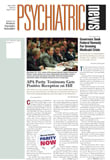Evidence-based medicine is a tool used in medical decision making that became popular when I was in medical school. Now that I am in residency, it is a part of my everyday vocabulary.
While in medical school, I thought evidence-based medicine (EBM) was an evil plot by epidemiologists and mathematicians to force me to learn their arcane language: positive predictive value, number needed to treat, sensitivity, specificity, and on and on. Now that I am a resident, I feel more confident in my medical decisions when I can say “the data show this” or “the data show that.” Even when I have to say “there are no data for this,” I feel my decision is more valid. Sometimes I even use this statement with patients, particularly when they are trying to convince me to prescribe the latest drug they saw advertised on television.
There are numerous benefits to making decisions with the evidence in mind, but the limitations clearly deserve mention. Most obvious is that “data” are not always available. This especially applies to the complex, profound interaction between patient and psychiatrist, which is maybe one of psychiatry’s most special aspects. The art of medicine is not easily quantified, and if you can’t quantify something, it is difficult to study it.
Furthermore, not everything or everyone can be studied. This is not a complete truth, because in some ways the information we collect about our patients is very often used in one study or another, even if it is just a study by the insurance company to assess “quality.”
The information age and technological advances that drive it are making data collection and sorting easier. However, assessing which information is useful and which is useless can be difficult. The endorsers of the information usually have more sophisticated number crunchers at their disposal than information readers. But that limitation can be countered by making readers more informed. This is happening in my residency training program and many others throughout the country.
Another challenge in incorporating EBM into psychiatry is that the usual sources of funding for studies favor drugs over nonpharmacologic therapies. Most double-blind, placebo-controlled trials (which provide the “highest” level of data and are very expensive) involve assessment of medication benefits and pharmaceutical company funding.
So why use EBM in psychiatry? There are numerous advantages to incorporating evidence-based decisions into training and practice. Some people (maybe even me) have criticized the idea as supporting “cookbook” medicine. The concern is that once guidelines for treatment are established, medical decision making will be unnecessary—simply follow the prescribed treatment and move to the next patient. In practice, guidelines can provide only the basic strategy, and the details of the treatment plan depend on patient and physician.
How to incorporate evidence-based decisions into the details is the next question. Search technology and EBM databases are quite advanced and can often yield several references for a question as specific as “How long do I continue lithium when used as an adjunct treatment for unipolar depression?” In years past, a resident might ask this question of an attending or two, and maybe a colleague, and would likely get several different answers, mostly based on personal preference or a few anecdotes. Now residents have the power to search across thousands of references to find whether anyone else was curious enough about the same question to perform a study. And EBM training allows us to understand some of the cryptic language used in the fine print so that we can judge whether the study is worth believing.
Another reason to include psychiatry in EBM relates to the first limitation I discussed above. I believe there are ways to measure the effects of the interaction between patient and psychiatrist. Some believe that this relationship is the main force behind the placebo effect. Researchers in nonpsychiatric fields acknowledge the importance of the patient-physician interaction, because trials are designed to keep this constant among study groups. And more powerful than the effect of generic interaction is the effect of trained and thoughtful interaction, or therapy. What if we had “data” to support therapy? In fact, there are some data to support certain types of therapy for certain diagnoses. But what if we had a lot more? Then we could turn to managed care organizations with more ammunition to justify treatment decisions. And why accept less rigorous information about therapy than we accept about new (or old) medications? Research suggests that the brain is altered by therapy, much as it is with pharmacology. Our standards should be high.
Residents are in a good position to question old practices and to use clinical curiosity in a way that can benefit the field of psychiatry. Residents need to learn how data are collected and presented, how they can be manipulated, when they are useful, and when they are useless. If we don’t learn, we may be more easily manipulated by pharmaceutical companies, by patients, or by the media. It is our responsibility to be informed, and EBM provides the tools.

